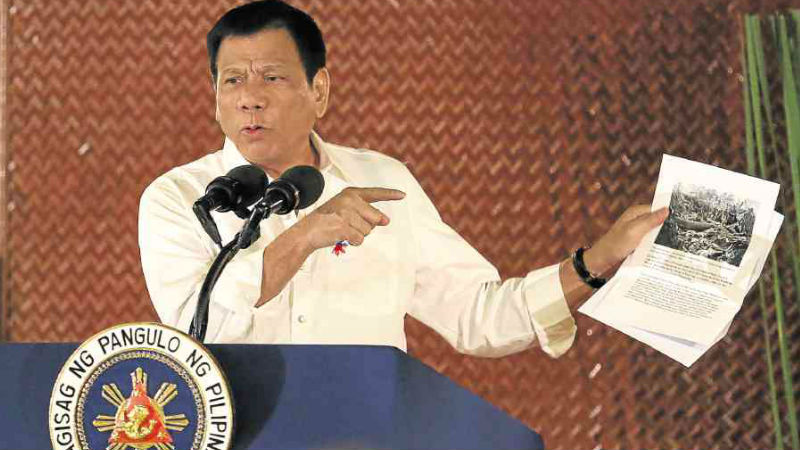Duterte: US forces must go

MASSACRE OF MOROS President Duterte shows photos of the Bud Dajo Massacre of Moro people, which involved American soldiers on a counterinsurgency mission in Jolo in 1906, in questioning US criticisms of his current campaign against illegal drugs, especially extrajudicial killings. He spoke after his new appointees took their oaths of office. JOAN BONDOC
PRESIDENT Duterte said on Monday he wanted U.S. forces out of his country’s south and blamed America for the restiveness of Muslim militants in the region, marking the first time he publicly opposed the presence of American troops in the country.
Duterte has had an uneasy relationship with the U.S. since becoming president in June and has been openly critical of American security policies. As a candidate, he declared he would chart a foreign policy that would not depend on America, his country’s treaty ally.
The U.S. military in 2002 deployed troops to train, advise and provide intelligence and weapons to Filipino troops battling the al-Qaida-linked Abu Sayyaf militants in the southern Philippines. When the American forces withdrew in February last year, U.S. officials said a smaller contingent of U.S. military advisers would stay. Details of the current U.S. military presence in the south were not immediately available.
Duterte did not mention any deadline or say how he intends to pursue his wishes. The U.S. Embassy did not immediately issue any reaction.
In opposing the U.S. military presence in the southern Mindanao region, Duterte cited the killings of Muslim Filipinos during a U.S. pacification campaign in the early 1900s, which he said were at the root of the long restiveness by minority Muslims in the largely Catholic nation’s south.
“For as long as we stay with America, we will never have peace in that land,” Duterte said in a speech before newly appointed government officials.
He showed black-and-white pictures of what he described as Muslim Filipinos, including children and women, who were slain by U.S. forces in the early 1900s and dumped in a pit, with American soldiers standing around the mass grave in Bud Daho, a mountainous region in southern Sulu province.
“The special forces, they have to go. They have to go in Mindanao, there are many whites there, they have to go,” he said, adding he was reorienting the country’s foreign policy. “I do not want a rift with America, but they have to go.”
Americans, the president said, would also be in constant danger in the south from local extremists like the brutal Abu Sayyaf militants.
If they see Americans, they’ll really kill them. They’ll get ransom and then kill you even if you are a black or a white American as long as you’re an American,” Duterte said.
Duterte repeated his criticism of U.S. President Barack Obama, who he said raised human rights concerns about the Philippine leader’s bloody crackdown against drugs when the U.S. leader, he says, has not apologized to the Philippines for the American atrocities against local Muslims.
Last week, Obama called off what could have been his first meeting with Duterte on the sidelines of an Asian summit in Laos after the brash Philippine president prefaced a warning on Obama against lecturing him on human rights with a brusque “son of a bitch.”
Despite the profane remark, the two leaders shook hands and had a brief chat in a holding room, where Duterte explained that his words were not directed at Obama.
While critical of U.S. policies, Duterte had taken steps to repair relations with China, which were strained under his predecessor over disputes in the South China Sea.
In his speech to officials on Monday, Mr. Duterte repeated comments from last week when he accused the United States of committing atrocities against Muslims over a century ago on Jolo island.
American troops are staying in the Western Mindanao Command headquarters in Zamboanga City. Both US and Philippine military officials refused to give the exact number of American soldiers.
Early this year, US troops trained elite policemen on marksmanship. The 45-day marksmanship training focuses on enhancing the skills and capabilities of Special Action Force (SAF) men.
Also early this year, US troops trained SAF men on tactical combat care or life-saving support inside the Zamboanga Ecozone and Freeport Authority in Barangay San Ramon. Associated Press, Marlon Ramos and Julie Alipala, Inquirer Mindanao